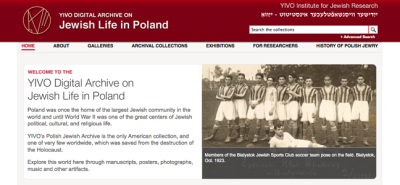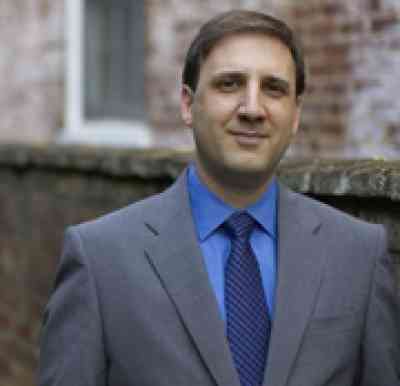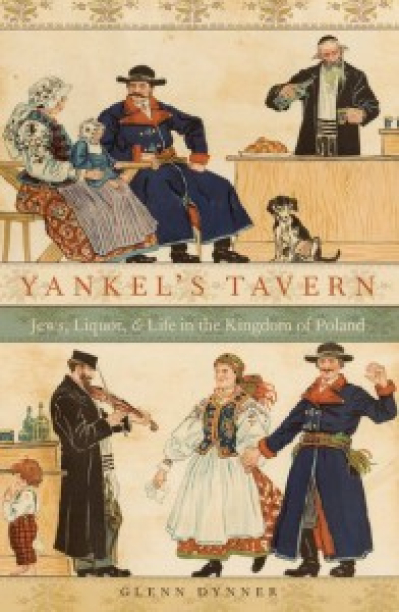Search results
1667 pages found for Yiddish club

Questions from Listeners - YIVO’s Program on WEVD (1964)
On December 27, 1964, host Sheftl Zak answered questions from listeners. Topics included YIVO’s plans for 1965, including projects related to its folklore collections and the upcoming publication of Uriel Weinreich’s Modern English-Yiddish Yiddish-English Dictionary (the dictionary was first published three years later, in 1968). From 1963-1976, YIVO had its own ...

From the Pages of Yedies
by ROBERTA NEWMAN When YIVO relocated to the United States in 1940, it wasted no time in establishing itself as a major repository of Jewish history. While it waited to learn the fate of its collections, building, workers, and associates in Vilna, it set out building a new home and mission ...

YIVO Launches the “YIVO Digital Archive on Jewish Life in Poland”
For Immediate Release
May 2, 2014
YIVO Institute for Jewish Research
15 West 16th Street
New York, NY 10011
Contact: Roberta Newman, Director of Digital Initiatives
rnewman@yivo.cjh.org
917-606-8293
NEW YORK, N.Y. The YIVO Institute for Jewish Research is delighted to announce the launch of the YIVO Digital Archive on Jewish Life in Poland, at polishjews.yivoarchives.org. The website provides access to thousands of digitized documents, manuscripts, photographs, artworks, films, and audio recordings relating to the rich and vibrant Jewish community in Poland before World War II. Conceived as an educational experience and a research tool, the new website has been developed to serve a broad audience of both the general public and scholars.

The Jewish Sound in Soviet Music: Interview with James Loeffler
On Sunday, May 4, 2014 at 3:00pm, YIVO will present Open Secret: The Jewish Sound in Soviet Music, as part of its ongoing Sidney Krum Young Artists Concert Series.
Before World War II, the Soviet Union was the only country in the world to officially promote Jewish music. After World War II, Soviet authorities declared that Jewish music did not exist. Yet all along, major Soviet composers such as Dmitri Shostakovich, Miecyzslaw Weinberg, and Mikhail Gnesin found deep inspiration in the sounds of Ashkenazi Jewish folk music. How did these composers manage to weave Jewish themes into some of the most stirring music of postwar Soviet society? How did they personally navigate the ongoing strictures of artistic censorship and the periodic cycles of antisemitic repression?
In this YIVO event, Professor James Loeffler, Yuval Waldman and the young artists of the Krum Concert Series will explore these questions through a unique pairing of music and words. In a blended lecture-concert, they will present several works including Dmitri Shostakovich's String Quartet No. 8, Mikhail Gnesin's Piano Trio in Memory of Our Perished Children, and Miecyzslaw Weinberg's Rhapsody on Moldavian Themes for violin and piano.
Attend the event.
James Loeffler is an Associate Professor of History and Jewish Studies at the University of Virginia. He also serves as Scholar-in-Residence at the Pro Musica Hebraica Foundation and as Academic Vice Co-Chair of the Jewish Music Forum of the American Society for Jewish Music. His first book, The Most Musical Nation: Jews and Culture in the Late Russian Empire was published by Yale University Press in 2010. It received awards from the Association for Jewish Studies, the Association for Slavic, East European, and Eurasian Studies, and the American Society of Composers, Authors & Publishers (ASCAP). In 2013-2014, he is Dean's Visiting Scholar on the Andrew Mellon Foundation New Foundations Fellowship at the Georgetown University Law Center. There he is working on a book about Jews, Israel, and international human rights.
Born in Russia and educated in Israel, the United States and Europe, Yuval Waldman has enjoyed great success as a violinist, conductor, and educator. Waldman has appeared as a soloist with orchestras in the United States, Canada, Europe and Israel and given recitals at Carnegie Hall, Lincoln Center, The Kennedy Center, Wigmore Hall in London, and Concertgebouw in Amsterdam. In 2005, Maestro Waldman founded Music Bridges International, to foster cross-cultural music exchange programs that feature the music of different countries. Under the Music Bridges banner, he organized the successful Young Artsist Strings Competition at the “Tchaikovsky’s Homeland” Center in Izhevsk/Votkinsk, Russia.
James Loeffler is interviewed here by Yedies editor, Roberta Newman.

Isaiah Trunk on the Lodz Ghetto (1964)
On December 20, 1964, historian Isaiah Trunk, a YIVO Research Associate and co-editor of the journals YIVO Annual and YIVO bleter, gave this interview to Sheftl Zak, host of YIVO’s radio program on WEVD, about his work researching the Lodz Ghetto and his book, Lodzher geto: a historishe un sotsyologishe ...

YIVO Welcomes Wesleyan University Students Investigating Jewish Material Culture
By JENNIFER YOUNG Professor Magda Teter, an instructor in YIVO’s Winter Program on Ashkenazi Civilization, visited YIVO on April 30 with her class from Wesleyan University, to participate in a full-day workshop on Jewish material culture. Teter’s Wesleyan course in East European Jewish History aims to take students beyond the common ...

From the Pages of Yedies
by ROBERTA NEWMAN I have often marveled at the almost unbelievable accomplishments of the Jewish activists of yore. Dr. Tsemach Szabad (1864-1935),for example, the legendary cultural leader and doctor from Vilna. Playing a leading role in the founding of YIVO in 1925 was only one of his projects in the period ...

From the Pages of Yedies
by ROBERTA NEWMAN This year, the 1938 Yiddish film classicMamele, starring Molly Picon, perhaps the world’s best-known Yiddish actress, was screened at the New York Jewish Film Festival in a version newly restored by the National Center for Jewish Film. But the first rediscovery of this film occurred in September 1978, when ...

The Jewish Tavern as Part of the Polish Landscape: Interview with Glenn Dynner
In Yankel's Tavern: Jews, Liquor & Life in the Kingdom of Poland (Oxford University Press, 2014), Glenn Dynner examines the iconic Polish Jewish tavernkeeper in the Kingdom of Poland.
In nineteenth-century Eastern Europe, the Jewish-run tavern was often the center of leisure, hospitality, business, and even religious festivities. This unusual situation came about because the nobles who owned taverns throughout the formerly Polish lands believed that only Jews were sober enough to run taverns profitably, a belief so ingrained as to endure even the rise of Hasidism's robust drinking culture.
As liquor became the region's boom industry, Jewish tavernkeepers became integral to both local economies and local social life, presiding over Christian celebrations and dispensing advice, medical remedies and loans. Nevertheless, reformers and government officials, blaming Jewish tavernkeepers for epidemic peasant drunkenness, sought to drive Jews out of the liquor trade. Their efforts were particularly intense and sustained in the Kingdom of Poland, a semi-autonomous province of the Russian empire that was often treated as a laboratory for social and political change.
Historians have assumed that this spelled the end of the Polish Jewish liquor trade. However, newly discovered archival sources demonstrate that many nobles helped their Jewish tavernkeepers evade fees, bans and expulsions by installing Christians as fronts for their taverns. The result—a vast underground Jewish liquor trade—reflects an impressive level of local Polish-Jewish co-existence that contrasts with the more familiar story of antisemitism and violence.
Buy the book.
Glenn Dynner is Professor of Judaic Studies at Sarah Lawrence College and the 2013-14 Senior NEH Scholar at the Center for Jewish History. In addition to Yankel’s Tavern, he is author of "Men of Silk": The Hasidic Conquest of Polish Jewish Society (Oxford University Press), winner of the Koret Publications Prize and finalist for the National Jewish Book Awards. He is editor of Holy Dissent: Jewish and Christian Mystics in Eastern Europe (Wayne State University Press); and co-editor of a forthcoming volume of Polin and of Warsaw, the Jewish Metropolis: Essays in Honor of the 70th Birthday of Professor Antony Polonsky.
He is interviewed here by Yedies editor, Roberta Newman.

May Their Memory Be for a Blessing
Three men who made their mark on Jewish life and culture passed from this world in the last week. Judith Berg and Felix Fibich, in four different poses, New York (?), ca. 1950s. (YIVO) Simon Alperovitch (Simonas Alperavičius), who served as executive director ofthe Lithuanian Jewish Community in 1989, and later, as chairman ...




